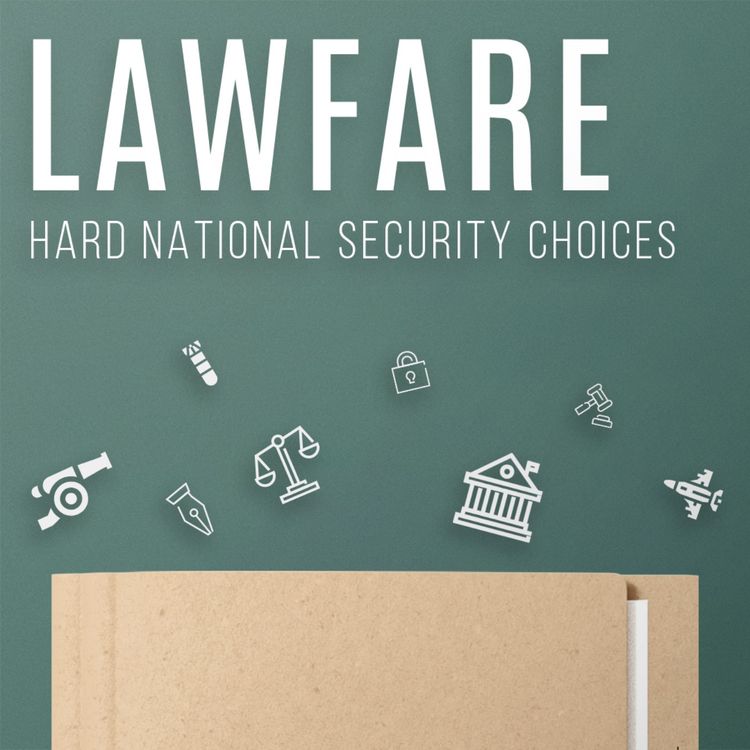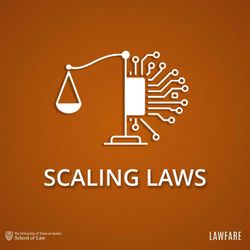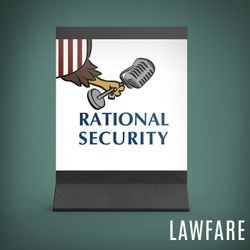Share

The Lawfare Podcast: Patreon Edition
Lawfare Daily: Digging Deep on the State of the Israeli-Palestinian Conflict with Joel Braunold
For today’s episode, Lawfare senior editor Scott R. Anderson sat down with Joel Braunold, Managing Director of the S. Daniel Abraham Center for Middle East Peace, for a deep dive on the current state of the Israeli-Palestinian conflict in these last few weeks before what could be a pivotal U.S. election.
They discussed the state of Prime Minister Benjamin Netanyahu’s governing coalition, recent developments relating to al-Haram al-Sharif and the West Bank, the state of Israel’s external relations with Iran, the United States, and the broader region — and what it all means for the increasingly stagnant conflict in Gaza.
To receive ad-free podcasts, become a Lawfare Material Supporter at www.patreon.com/lawfare. You can also support Lawfare by making a one-time donation at https://givebutter.com/c/trumptrials.
More episodes
View all episodes

Lawfare Archive: A Jan. 6 Committee Staffer on Far-Right Extremism
57:24|From February 15, 2023: The Jan. 6 committee’s final report on the insurrection is over 800 pages, including the footnotes. But there’s still new information coming out about the committee’s findings and its work.Last week, we brought you an interview with Dean Jackson, one of the staffers who worked on the Jan. 6 committee’s investigation into the role of social media in the insurrection. Today, we’re featuring a conversation with Jacob Glick, who served as investigative counsel on the committee and is currently a policy counsel at Georgetown’s Institute for Constitutional Advocacy and Protection. His work in the Jan. 6 investigation focused on social media and far-right extremism. Lawfare senior editor Quinta Jurecic spoke with Jacob about what the investigation showed him about the forces that led to Jan. 6, how he understands the threat still posed by extremism, and what it was like interviewing Twitter whistleblowers and members of far-right groups who stormed the Capitol.You can read Jacob’s essay with Mary McCord on countering extremism here in Just Security and listen to an interview with Jacob and his Jan. 6 committee colleagues here at Tech Policy Press.
Lawfare Daily: The Legal Fallout After a Fatal ICE Shooting in Minneapolis
40:57|Lawfare Senior Editor Anna Bower speaks with fellow Senior Editors Eric Columbus and Mike Feinberg about the fatal shooting of Renee Nicole Good by an ICE officer in Minneapolis. The discussion covers what is currently known about the incident and the conflicting accounts offered by DHS and the White House in contrast with bystander video. The panel also discusses DHS use-of-force policies, the federal government’s reported investigation of the shooting, and the legal framework governing state prosecutions of federal officers.
Scaling Laws: A Year That Felt Like a Decade: 2025 Recap with Sen. Maroney and Neil Chilson
54:36|Connecticut State Senator James Maroney and Neil Chilson, Head of AI Policy at the Abundance Institute, join Kevin Frazier, the AI Innovation and Law Fellow at the University of Texas School of Law and a Senior Editor at Lawfare, and Alan Rozenshtein, Associate Professor at Minnesota Law and Research Director at Lawfare, for a look back at a wild year in AI policy.Neil provides his expert analysis of all that did (and did not) happen at the federal level. Senator Maroney then examines what transpired across the states. The four then offer their predictions for what seems likely to be an even busier 2026. Find Scaling Laws on the Lawfare website, and subscribe to never miss an episode.
Rational Security: The “Caracas Like a Hurricane” Special Venezuela Edition
01:05:47|This week, Scott sat down with his Lawfare colleagues Benjamin Wittes, Natalie Orpett, and Molly Roberts for a special deep-dive into the intervention in Venezuela, including:“A Hop, Skip, and Jump Across the Rubicon.” This past weekend, the Trump administration took the step that Trump has been threatening for months: he deployed special operations to capture Venezuelan dictator Nicolás Maduro and bring him to the United States for criminal prosecution. The targeted operation was only hours long and resulted in no American fatalities, though more than 70 people in Venezuela were reportedly killed. The Trump administration has described it as a “law enforcement” operation. But what was it really? And where did he get the authority to do it?“A Truly Extraordinary Rendition.” By Monday, Maduro and his wife were in New York being arraigned on an array of drug- and weapons-related conspiracy charges. But prosecuting a head of state—albeit one not recognized by the United States—presents certain unique challenges. How should we expect the criminal case to proceed? “Running in Place.” President Trump has asserted that he and his advisers are now going to “run” Venezuela. But he’s left Maduro’s deputy, Delcy Rodríguez, in place, in lieu of the opposition movement the United States and many other countries have recognized as Venezuela’s legitimate government. Trump and his advisers seem intent on dictating terms to Venezuela through the “leverage” provided them by the ongoing quarantine over Venezuela’s oil, and potentially the threat of additional military action. But can this light-touch strategy succeed? In object lessons, (notably Chicagoan) Natalie delights in her long-standing admiration of The New Yorker with Netflix’s documentary “The New Yorker at 100.” Molly approaches Trump’s takeover of D.C. golf courses with a pitch for Knotty by Nature’s wooden putters. Scott honors the 5th anniversary of the Jan. 6, 2021, attack on the Capitol with a recommendation of Ellie Silverman’s moving profile of Nathan Tate in the Washington Post. And Ben honors the same anniversary with both a revisiting of Lawfare's narrative podcast series The Aftermath, and, relatedly, a surprise interview by Holly Berkley Fletcher with one of the attack’s most infamous perpetrators.
Lawfare Daily: Mary Clare Jalonik on ‘Storm at the Capitol’
47:01|Senior Editor Michael Feinberg and Associated Press reporter Mary Clare Jalonik sit down to discuss Mary Clare’s oral history of the events of Jan. 6, “Storm at the Capitol.” The two reflect on their own experiences from that day, and try to puzzle out what lessons can be drawn from them five years later.
Lawfare Daily: The Trials of the Trump Administration, Jan. 5
01:20:28|In a live conversation on YouTube, Lawfare Editor in Chief Benjamin Wittes sat down with Lawfare Senior Editors Anna Bower, Scott Anderson, Michael Feinberg and Eric Columbus and Lawfare Associate Editor Katherine Pompilio to discuss the Supreme Court’s decision on President Trump’s domestic deployment of the National Guard in many cities, Jack Smith’s testimony in front of the House, developments in Kilmar Abrego Garcia’s case, a hearing in the arrest of Venezuelan President Nicolas Maduro and his wife, and moreYou can find information on legal challenges to Trump administration actions here. And check out Lawfare’s new homepage on the litigation, new Bluesky account, and new WITOAD merch.
Lawfare Daily: Jan. 6, 2026: Five Years of Congressional Action and Inaction
01:04:52|Today is the fifth anniversary of the Jan. 6, 2021, attack at the U.S. Capitol. That day marked the beginning of a reckoning across the entirety of the U.S. government. How did this happen? What does it mean? And how do we stop it from happening again? On today's podcast, Executive Editor Natalie Orpett discusses how Congress has been responding to these questions with current and former Lawfare senior editors Eric Columbus, Quinta Jurecic, and Molly Reynolds. They talk about what Congress has done, what it hasn’t, and how we should understand the legacy of Jan. 6—so far. You can read, watch, and listen to Lawfare's five years of Jan. 6 analysis on our website.
Lawfare Daily: The U.S. Strike on Venezuela and Capture of Nicolás Maduro
49:34|During a live YouTube discussion on Jan. 4, Lawfare Editor in Chief Benjamin Wittes sat down with Lawfare Senior Editor Scott R. Anderson, Foreign Policy Editor Dana Stuster, and Public Service Fellow Loren Voss to discuss what we know—and what we don’t know—about the legal issues raised by the U.S. strike on Venezuela and the capture of Venezuelan leader Nicolás Maduro. They spoke about what the administration's possible policy goals are in Venezuela, the potential legal justifications for the attack and capture of Maduro, and whether or not the United States is at war with Venezuela or some sub-groups.
Lawfare Archive: How the FCC is Tackling National Security with Enforcement Bureau Chief Loyaan Egal
55:11|From October 9, 2024: For today’s episode, Loyaan Egal, the Chief of the Enforcement Bureau at the Federal Communications Commission (“FCC”), sat down with Lawfare Senior Editor and General Counsel Scott R. Anderson and Lawfare Contributing Editor and Morrison Foerster partner Brandon Van Grack to discuss the FCC’s growing but often underappreciated role in advancing U.S. national security. They covered how the FCC’s mandate intersects with U.S. national security concerns, how the FCC is tackling cutting-edge issues ranging from undersea cables to artificial intelligence-enabled election interference, and what other national security challenges the FCC is looking out for on the horizon. This episode is part of our special series, “The Regulators,” co-sponsored with Morrison Foerster, in which Brandon and Scott sit down with senior U.S. officials working at the front lines of U.S. national security and economic statecraft.